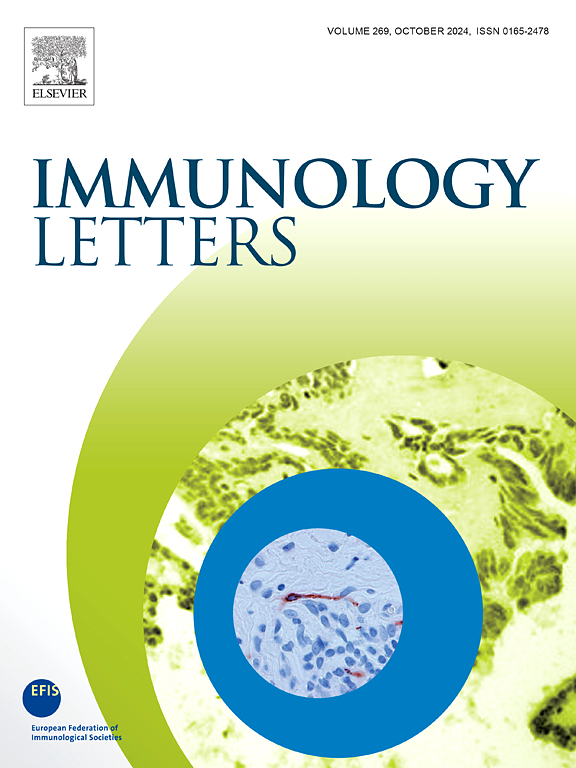阿法替尼对肠道和唾液IgA的影响:与胃肠道副作用相关的免疫反应改变
IF 2.8
4区 医学
Q3 IMMUNOLOGY
引用次数: 0
摘要
背景:阿法替尼是一种有效的口服分子靶向抗癌药物,但会引起明显的胃肠道副作用。这些作用与肠细胞中的EGFR抑制和微生物群的变化有关。目的探讨阿法替尼对大鼠肠道黏膜免疫的影响,重点关注肠道和唾液中的IgA水平,并了解对这些副作用的先天和获得性免疫反应。方法小型Wistar大鼠每日给予阿法替尼(5.2 mg/kg),连续24 h(第1天)和2周(第14天)。采用定量聚合酶链反应分析肠内基因表达。采用酶联免疫吸附法测定肠道和唾液中的IgA水平。结果沙法替尼抑制空肠和回肠α-防御素5和pIgR,表明先天免疫功能降低。它增加了肠道和唾液中的IgA水平,表明获得性免疫发生了改变。唾液IgA水平与肠道IgA水平显著相关。结论沙法替尼影响胃肠道黏膜免疫,抑制先天防御,改变IgA的产生。唾液IgA可以作为监测这些影响的标记物,帮助癌症治疗管理。本文章由计算机程序翻译,如有差异,请以英文原文为准。

Impact of afatinib on intestinal and salivary IgA: Immune response alterations linked to gastrointestinal side effects
Background
Afatinib, an oral molecular-targeted anticancer agent, is effective but causes significant gastrointestinal side effects. These effects are associated with EGFR inhibition in intestinal cells and changes in the microbiota.
Objective
To investigate the effects of afatinib on intestinal mucosal immunity in rats, focusing on IgA levels in the intestine and saliva, and to understand the innate and acquired immune responses to these side effects.
Methods
Male Wistar rats received afatinib (5.2 mg/kg) daily for 24 h (Day 1) and for 2 weeks (Day 14). Gene expression in the intestine was analyzed using quantitative polymerase chain reaction. IgA levels in the intestine and saliva were measured using enzyme-linked immunosorbent assay.
Results
Afatinib suppressed α-defensin 5 and pIgR in the jejunum and ileum, indicating reduced innate immunity. It increased IgA levels in the intestine and saliva, suggesting altered acquired immunity. Salivary IgA levels significantly correlated with intestinal IgA levels.
Conclusions
Afatinib affects gastrointestinal mucosal immunity, suppresses innate defense, and alters IgA production. Salivary IgA could serve as a marker for monitoring these effects, aiding cancer therapy management.
求助全文
通过发布文献求助,成功后即可免费获取论文全文。
去求助
来源期刊

Immunology letters
医学-免疫学
CiteScore
7.60
自引率
0.00%
发文量
86
审稿时长
44 days
期刊介绍:
Immunology Letters provides a vehicle for the speedy publication of experimental papers, (mini)Reviews and Letters to the Editor addressing all aspects of molecular and cellular immunology. The essential criteria for publication will be clarity, experimental soundness and novelty. Results contradictory to current accepted thinking or ideas divergent from actual dogmas will be considered for publication provided that they are based on solid experimental findings.
Preference will be given to papers of immediate importance to other investigators, either by their experimental data, new ideas or new methodology. Scientific correspondence to the Editor-in-Chief related to the published papers may also be accepted provided that they are short and scientifically relevant to the papers mentioned, in order to provide a continuing forum for discussion.
 求助内容:
求助内容: 应助结果提醒方式:
应助结果提醒方式:


